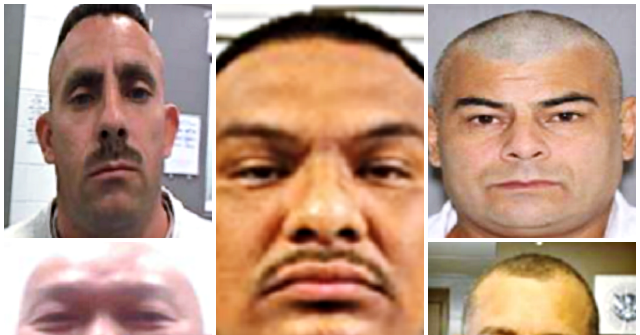On Sept. 16, Barbara Gomes Marques May and her husband arrived at the downtown Los Angeles federal immigration building for what they believed would be the final step in Marques May’s process to obtain her green card.
The interview process had gone smoothly, Tucker May recalled. But toward the end, a federal immigration official she had met with said he needed Marques May to follow him so he could photocopy her passport, he recalled. She and her husband believed the trip would be brief and they would be able to leave.
Instead, an Immigration and Customs Enforcement agent arrested Marques May, a 38-year-old Brazilian national who has no criminal record and works as a film director in Los Angeles. She was handcuffed and transferred to the ICE facility in Adelanto in San Bernardino County before being sent to Louisiana. Meanwhile, her husband and her lawyer scrambled to try to stop her deportation.
On Wednesday, Marques May was scheduled to board a 6 a.m. flight to her home country, but her attorney was able to file a motion to reopen her deportation proceedings and keep her on U.S. soil, at least temporarily. As of Thursday, she had been moved to Arizona and will return to California while her deportation proceedings remain open, her attorney said.
“It’s very much an ongoing nightmare,” Tucker May said in an interview this week.
Department of Homeland Security officials did not respond to a request for comment about Marques May’s case.
According to her attorney, Marcelo Gondim, Marques May arrived in the U.S. in 2018 on a tourist visa. Gondim said she applied for an extension but was denied. She ended up overstaying her visa, he said, and in 2019, the government sent her a notice to appear for a court hearing to begin deportation proceedings.
But Marques May had moved and had not kept her address up to date with immigration court, and so the letter never reached her, Gondim said. Because she failed to appear, the government issued a removal order against her.
In April 2025, the couple got married and she began the process to apply for a green card, Gondim said. Under the Biden administration, he said, U.S. Citizenship and Immigration Services would have notified Marques May that there was a removal order issued for her and directed her on how to get it resolved.
Overstaying a visa is not considered a criminal offense, and penalties are issued if the person leaves the country. In cases involving married couples, Gondim said, there’s an automatic forgiveness for overstaying a visa, relief that Marques May would’ve been eligible for.
But the Trump administration has instead used courthouses and Citizenship and Immigration Services offices to engage in mass arrests of migrants attending mandated hearings and appointments. Soon, the USCIS will have expanded powers.
In September, the Department of Homeland Security issued a new directive that will allow the agency — which administers and oversees immigration applications — to enforce immigration law with “special agents.” The order goes into effect Monday.
“USCIS will have greater capacity to support DHS efforts by handling investigations from start to finish, instead of referring certain cases to Homeland Security Investigation within U.S. Immigration and Customs Enforcement,” the agency said in a statement.
After Marques May was arrested, May struggled to figure out where federal authorities had sent his wife. Finally, he was able to get in touch with her, and she detailed how, when she was arrested in L.A., she burst into tears, and an ICE agent took a selfie with her, he said.
During her transfer between detention facilities, she told him, she was subjected to harsh conditions, including how she went without food or water for more than 12 hours and had access to bathrooms with no toilet paper. She was given only bread and water and a couple of times an apple.
Marques May, who had surgery this year for chronic back problems, was also denied medical treatment for a device she uses to manage her pain, he said. May went public with her arrest more than a week after she was detained, he said, because he had run out of all legal avenues.
“There is an open disdain being shown by ICE for the basic rule of law for this country,” he said.
May began posting about her arrest online, garnering hundreds of responses and support. A GoFundMe page had raised more than $50,000 as of Thursday. U.S. Rep. Judy Chu (D-Monterey Park), who counts Marques May as one of her constituents, said she was “doing everything possible to prevent her deportation and I’m demanding that ICE follow the law.”
“Unfortunately, Barbara’s case is not unique, it reflects a broader pattern under Trump’s immigration policies that are unlawful and cruel,” she posted on X.
Gondim said he repeatedly tried to stop her from being transferred to facilities outside California, only to find barriers and delays by ICE officials to getting legal documents for her to sign. From Adelanto, she was transferred to Arizona, then Louisiana.
The government is not doing anything wrong by complying with the removal order, he said, “but they cannot prevent the person from having access to counsel and be able to present their case to file some form of relief [so they] don’t get unjustly deported.”
To stop Marques May’s imminent deportation, Gondim filed separate motions to reopen her deportation proceedings and terminate her deportation proceedings. Until a judge rules on the case, Gondim said, ICE cannot deport her. He said he’s hopeful that she will end up being released.
“Since she has already an approved petition from her U.S. citizen husband, and she has a clear path to filing a new [application] and getting her green card,” he said, an immigration court judge will not be interested in pursuing a case against a person who should be approved for permanent residency by law.
Until then, May said his wife’s first feature film has been put on hold until she can be released. In 2021, Marques May premiered her short film, “Pretas,” at the Culver Theater for the L.A. Brazilian Film Festival. The film centers on Black women and their experiences dealing with racism and carries a message of creating a more anti-racist society.
“I love Los Angeles so much,” she said in an interview at the time. “I couldn’t be happier. It was a premiere I wasn’t expecting.”
It was their shared love of films that bonded the couple, who met on a dating app, May said. They spent a lot of their time together watching movies, sharing popcorn and then discussing what worked and didn’t in the films.
May says he now thinks about all the immigrants who have not committed any crimes but lack the legal resources to avoid deportation.
“These are human beings that these terrible things are happening to,” he said. “If anybody reads stories like this, if they think this doesn’t apply to them because they’re not married to an immigrant, I beg those people to consider what they think comes next.”
The post She went to get her green card and now faces deportation. Did the feds trick her? appeared first on Los Angeles Times.




